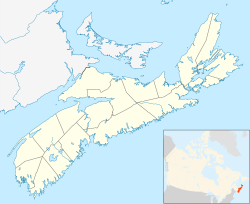Cape St. Mary's (French:Cap-Sainte-Marie) is a community in the Canadian province of Nova Scotia, [1] located in the District of Clare in Digby County . The harbor is home to a number of fisheries that, as of 2015, were worth more than $5,000,000 annually. The harbour serves as homeport to a fleet of 42 fish harvesters and 14 fishing vessels. As many as nine transient ships spend time operating from the harbour, as well. [2]
In 2014 a hydrographic survey was conducted by the Fisheries and Oceans Canada and found that the harbor was in need of major dredging to protect the local fleet. [2] Cape St. Mary's is scheduled for a major capital construction project that will improve the harbor by adding a new breakwater and groyne extension. [2]
